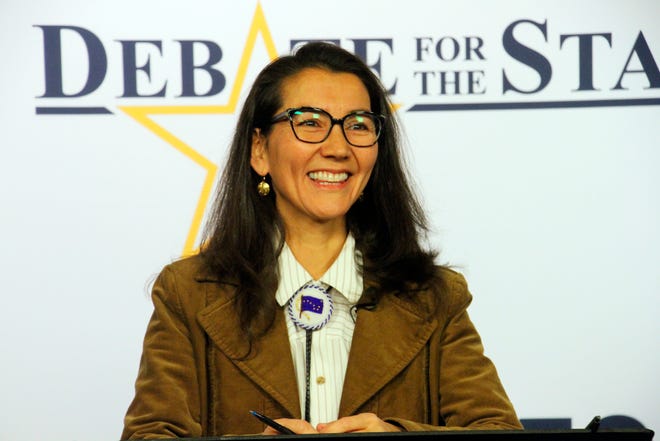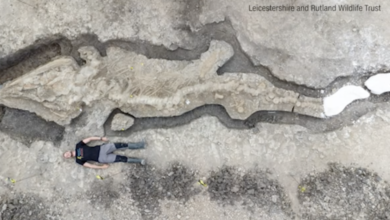
- USA TODAY checked all freshman members of Congress
- That should be simple but federal privacy laws and university bureaucracies get in the way
Note: USA TODAY is continuing to update this story as additional information becomes available.
George Santos is an anomaly among lawmakers when it comes to fabricating his education credentials, based on a USA TODAY review of his fellow freshmen members of Congress.
But it turns out those credentials are rarely vetted.
The Long Island congressman claimed to have degrees from Baruch College and New York University, neither of which have a record of Santos earning a degree – a fact only publicized after he was elected in November.
Educational background checks for 91 out of 93 freshman members held up, in most cases for all of their cited degrees. About a dozen universities did not respond and the two discrepancies that emerged both were minor compared to Santos’.
In reaching out to 139 schools named in official biographies, campaign materials and news articles by the new senators and congress members, reporters heard back from dozens that few media outlets, sometimes none, had tried to verify the then-candidates’ educational credentials during the past year.
“We firmly believe in the importance of checking credentials and resume claims of all individuals who run for public office. You are the first and only reporter to request this info from A&T,” Todd Williams, spokesman at North Carolina Agricultural and Technical State University wrote in confirming the degree of Rep. Jonathan Jackson, a Democrat elected this year to represent Illinois’ 1st Congressional District.

One of the discrepancies was Rep. Mary Sattler Peltola, D-Alaska, whose congressional biography states she attended the University of Northern Colorado from 1991 to 1994. The university confirmed her attendance, but only from 1991 to spring 1993. And it added in an email, “our records reflect that no entity has requested this information except for you, today.”
Peltola’s office did not respond to requests for comment.
Rep. Troy Carter, D-Louisiana, stated on his congressional website that he earned a Master of Business Administration from Holy Cross University. A June 2021 press release from the institution – actually named University of Holy Cross – said Carter earned a Master of Science in Management, a degree that typically takes less time to complete than an MBA. The private university in Louisiana confirmed to USA TODAY that its news release was correct.

Though the differences might seem superficial, an MBA carries more prestige said John Byrne, the editor in chief of Poets and Quants, a publication focused on business schools.
Byrne said masters of science in management programs are typically geared toward people with less work experience, are easier to get into and don't usually require the same depth of study as MBA programs.
Those in the business field would “know the difference immediately” between the two degrees, he said, adding, “There’s no doubt that the MBA is a more prestigious degree and it’s a degree that would get you a better job.”
Following USA TODAY’s inquiries, Carter’s page was updated to the correct degree and university name. “The discrepancy was a staff error and has since been corrected,” said, Sara Severens, a spokeswoman for Carter.
Vetting is a tradition of campaigns
Revelations about inaccuracies in Santos’ education and employment background broke open after he was elected, in an investigation by the New York Times. The discrepancies, which he has called “embellishments,” have led to criminal investigations, calls for a House Ethics Committee probe and calls for his resignation.
They also have caused political officials and the media to take a hard look at their vetting processes.
In finger-pointing about missed Santos red flags, Democratic party officials pointed back at the media. Jason Kaplan, a campaign consultant for Santos’ Democratic opponent Robert Zimmerman tweeted that, “we’ve been screaming it from the rooftops since September.”

The Democratic Congressional Committee distributed its research book – traditionally sent to reporters and party officials – well before the election. It raised questions about some of Santos’ record, but not all. His college credentials, for instance, were not questioned.
New York University sends third party requests to a clearinghouse to process validation requests, potentially a roadblock that could explain how Santos’ record went unnoticed.
“My biggest concern is that this story gets forgotten,” Zimmerman said. “We need to toughen the laws that hold you accountable for lying on your ethics forms and invest in the local media because journalism is the front line defense to this.”
Colleges cite privacy restrictions
Vetting college credentials is traditionally a simple process for media and political researchers alike. Still, several universities either didn’t respond to USA TODAY, demanded formal written state records requests or declined to provide information citing federal privacy laws – laws that allow people to put a hold on their own files.
Among the schools that did not verify degrees by the deadline for this story: Yale University and the Morehouse School of Medicine. Yale later confirmed degrees for Rep. Daniel Goldman, D-N.Y.; Rep. Kevin Kiley, R-California; Rep. Seth Magaziner, D-R.I. and Sen. J.D. Vance, R-Ohio.
'Stunning' lies:Nassau County district attorney to investigate GOP Rep.-elect George Santos
The University of North Carolina at Chapel Hill confirmed a 2009 law degree for Rep. Jeff Jackson, D-N.C., but not for Rep. Rob Menendez, a Democrat who represents New Jersey and is the son of Sen. Rob Menendez. The congressman’s staff later sent a certificate of his degree from the university confirming he had earned a bachelor’s degree in 2008.

Middle Tennessee State University said the university would only answer questions about Rep. Andy Ogles, R-Tenn. with his permission.
A spokesman for Ogles did not respond to questions about whether the congressman had put a hold on the records or whether he would lift it. The office later shared a photo of Ogle’s bachelor’s degree certificate as proof.
Nova Southeastern University, where Rep. Jared Moskowitz, D-Florida, stated he earned his law degree, said it was the institution’s policy to “not provide information on its students without the expressed consent and authorization of the student(s) in question.”
After this story's publication, Moskowitz and his office contacted USA TODAY and the university. Nova Southeastern has since confirmed that Moskowitz graduated from its school of law in 2007.
Cornell University also provided information about some, but not all of its graduates. It confirmed that Rep. Wesley Hunt, R-Texas, had earned an MBA and Master of Public Health in 2015, and another master’s degree in 2016. But the university initially said that it had “no information available” on Rep. Melanie Stansbury, D-N.M.

The university had touted Stansbury as a graduate in June 2021, however, when she won a special election to fill a vacancy left by Deb Haaland, who became secretary of the Interior. After USA TODAY contacted Stansbury’s office, the university confirmed she earned a master’s degree in sociology in 2007.
Mike Klocke, spokesman for the University of the Pacific-Stockton said it was news to them that an alumnus had just been elected to Congress. The campus then located California’s newly minted representative John Duarte, R-Calif. on their MBA rolls.
Partnerships with nonprofit add complications
Some universities sent reporters to the National Student Clearinghouse, a non-profit based in Virginia that performs degree verification for employers and alumni, for a $14.95 per search fee and only with the applicant’s permission.
The service has drawn the ire of online reviewers, who filed complaints with the Better Business Bureau.
“I'm now being arbitrarily charged $13 for a glimpse at a pdf proving my degree's existence.” one user wrote. “This kind of service is easily offered by universities for free (and it WAS free until my school partnered with SCH), as students have already paid tremendous sums of money for their degree. Unnecessary middleman businesses like Student Clearinghouse should be ashamed of their own existence. This is a straight up ransom.”
The nonprofit reported about $80 million in revenue in 2021, according to IRS records.
A company spokesman said it “needs to charge a fee to offset the time and expense to create and upkeep the verification technology that helps institutions focus on their mission and to support students.”
He noted that the service claims to have saved institutions $750 million annually and added that media or other interested parties can still contact universities directly to verify credentials.
Trends in college degrees
The freshmen class in the House and Senate holds a wide variety of educational credentials.
Eight members of the new class graduated from military schools, including West Point, the U.S. Naval Academy in Maryland and the U.S. Air Force Academy in Colorado. Representatives Patrick Ryan, D-N.Y., Wesley Hunt, R-Tex. and John James, R-Mich. all graduated as members of the 2004 class at West Point, according to university records. Additionally, Rep. Keith Self, R-Tex. graduated as a member of the USMA Class of 1975.

Yale and Harvard are well-represented as well, with nine alumni joining in the freshmen class.
Several new members are highly educated, including Democrat Yadira Caraveo, a pediatrician serving Colorado's 8th congressional district. In all, 23 new representatives and senators hold law degrees; two hold PhD’s: Rep. Shri Thanedar, D-Mich. In chemistry and Rep. Julia Letlow, R-La in communication.
Among the less highly educated: Rep. Eli Crane, R-Ariz. attended college but didn’t graduate. Rep. Chuck Edwards, R-N.C. attended but didn’t graduate from Blue Ridge Community College and Rep. Maxwell Frost, D-Fla. is several credits short of a degree at Valencia College, the university confirmed. Rep. Marcus Molinaro, R-N.Y. graduated from Dutchess Community College, a public school in New York, and is one of the few lawmakers with only an associates degree.
None of these lawmakers suggested they had done more than attend these institutions in their congressional biographies.
Researcher notes decline in elite credentials
Craig Volden, a professor of political science at University of Virginia said the number of lawmakers who have attended elite Institutions – largely those atop the U.S. News and World Report rankings – have fallen since the 1970s.
Volden included among elite schools Ivy League institutions such as Dartmouth College and Brown University and public institutions such as the University of California, Berkeley and the University of Texas at Austin.

The decline in elite educated lawmakers occurred mainly among Republicans in both the Senate and House. In the Senate, more than half of Democrats attended elite colleges whereas only about a quarter of Republicans had done so. In the House, about a third of liberal lawmakers attended top colleges compared to just 13% of Republicans.
Ivy leagues and other highly selective colleges still remain highly represented in the freshmen class.
About 20% of the new members attended a school Volden and his coauthors identified as elite, according to USA TODAY’s analysis. Some, such as Sen. John Fetterman, D-Pennsylvania, attended public institutions, the University of Connecticut, and private schools, Albright College and Harvard for Fetterman.
Vance attended Ohio State University before Yale Law School. (Ohio State said no one had checked Vance’s Buckeye bonafides). Others, such as Magaziner, D-R.I. attended only Ivies: Brown for undergrad and Yale for business school in Magaziner’s case.
In a November 2022 paper analyzing Congress members’ educations from 1973 to 2015, Volden and his coauthors – Jonathan Wai at University of Arkansas, and Alan E. Wiseman at Vanderbilt University – found Democrats in the House with elite educations are more effective than Senate Democrats or Republicans in either chamber.

Volden said the team determined effectiveness by measuring how far a lawmaker’s legislation moved through Congress, whether it was taken up in committees and if it became law. Commemorative bills, such as those renaming buildings, were given less weight than those that changed federal policy.
Among lawmakers, the most common advanced degree is a juris doctor – a law degree – although Volden said he found little evidence to suggest that members with law degrees are more effective than those without one. Just under a quarter of the new members hold a law degree, according to a USA TODAY analysis.
Volden and coauthors also found that lawmakers, both Democratic and Republican, who attended elite colleges were more likely to be liberal compared to their party peers than lawmakers who graduated from other institutions.
The researchers suggested further study could reveal what’s driving these shifts. Is it that elite-educated Republicans fell out of favor as their base moved farther right? Or did diminishing numbers of lawmakers with that educational background enable a more conservative shift? And Volden questioned whether a similar decline in the number of elite-educated Democrats could be looming.
“The Republican trends are probably going to level out.” Volden said. “Currently, Democrats are dramatically overeducated relative to the public.”
Chris Quintana and Nick Penzenstadler are reporters on the USA TODAY investigations team. Contact Chris at [email protected] or 202-308-9021. Follow him on Twitter at @CquintanaDC. Contact Nick at [email protected] or @npenzenstadler, or on Signal at (720) 507-5273.
Source link







